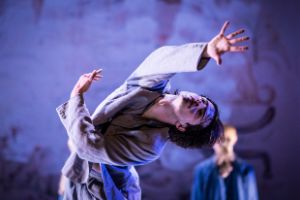
Olivier Messiaen, 1986 © Photo Rob C. Croes, National Archiv, Wikimedia Commons
Olivier Messiaen
In his work, Olivier Messiaen (1908 – 1992) aims, first of all, to overwhelm the listener with sensuality of sound. At the same time, this music, which can have such an intoxicating effect, is based on rationally calculating methods inspired by mathematics. Messiaen derives rhythms and harmonies from the repetition of the smallest structural features. In doing so, he draws on influences of the most diverse kind, ranging from stylised bird calls to Gregorian chant and non-European music.
Messiaen was born in Avignon on 10th December 1908. His affinity for music and his creative talent emerged at an early age and were encouraged by his literary and artistic parents. In 1931, Messiaen began his musical career as organist at Sainte Trinité, one of the great Parisian churches, a position he held until his death – for more than 60 years. Of course, he also composed for his instrument, and in addition to orchestral and piano music, his music for the organ, expressing most clearly the mystical Catholicism to which Messiaen adhered, is one of the mainstays of his oeuvre. His first phase, which culminated in the monumental “Turangalîla Symphony” (1946–48), was still clearly reminiscent of Debussy and Ravel. The compositions from 1949 onwards, such as the era-defining “Quatre Études de rhythme” for piano, then brought a radical creative shift from exuberant opulence to strict constructivism. In the works of the following period, which were largely inspired by birdsong, such as the piano cycle “Catalogue d'oiseaux” (1956–58), Messiaen gradually resumed elements of his earlier work and thus found his characteristic style: He combines chorale-like melodies, which frequently emerge in extremely calm movement, discordant sound fields of a complexity impossible to comprehend, and other heterogeneous elements into irregular mosaics, which overwhelm the listener above all through their tonal effects. In 1975, Messiaen, by then a world-famous composer, began to work on the opera “Saint François d’Assise”, which was premiered in November 1983 and which he considered the masterpiece of his oeuvre. The composer died in Paris on 28th April 1992.
As of: December 2024